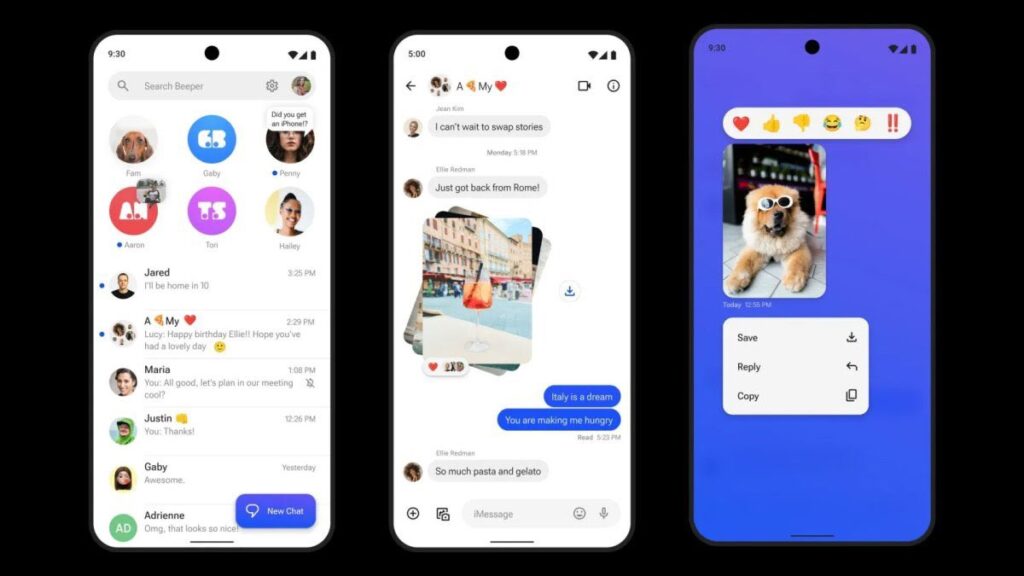Was it this good? According to a post on X on Friday, Beeper, the business that reverse-engineered iMessage to enable blue bubble texts for Android users, is currently experiencing an outage. And it appears that Apple is at fault. When attempting to send texts using the recently released Beeper Mini, users—including those at TechCrunch with access to the app—began encountering error warnings, and their messages were not being sent.
The error message is displayed in red characters and says, “Failed to lookup on server: lookup request timed out.”
An earlier response from a Beeper staff member to a Reddit question on whether or not the app was broken read, “Report a problem from the app; give us a chance to look into it.”
In response to TechCrunch’s question regarding Beeper Mini’s status, Eric Migicovsky, the CEO of Beeper, directed us to the X post that acknowledged the downtime and offered further information. When asked if Apple had somehow managed to disable Beeper Mini, he answered, “Yes, all data indicates that.”
We are uncertain about the implications for Beeper Mini’s future endeavors, barring a solution from Beeper’s developers.
Migicovsky, who also invented the Pebble timepiece, maintained that Beeper Mini improved security for iPhone users and Android users eager to join their friends’ group iMessage discussions.
The creator of Beeper Mini clarified in an interview conducted before the device’s release that green bubble texts were not encrypted.
This implies that anyone can read your texts to your Android buddies. Apple can read the correspondence. Your phone provider can read the message. Google is as simple as a postcard. It is readable by anybody. Thus, Beeper Mini genuinely improves iPhone security,” he had stated to TechCrunch.
Also Read: iMessage For Android , Google Released Gemini AI
On the other hand, Apple refuses to release an iMessage app for Android because it views iMessage as one of the most essential tools for enticing customers into its ecosystem. There was some expectation that EU regulations would compel it to improve iMessage’s interoperability. Still, according to news this week, iMessage will be exempt from those requirements since corporate users do not find the service sufficiently popular. Thus, if Apple could shut down Beeper Mini, it would have no excuse not to.
That’s not how Migicovsky feels about the sequence of events.
He remarked, “I would be very interested to hear why they think it makes sense to make security worse for iPhone users.”
“The most important question, assuming it’s Apple, is why they would try to shut down a service that lets iPhones send encrypted chats to Android users if Apple cares about the security and privacy of its iPhone customers. It’s evident from Apple’s announcement of RCS support that they are aware of this serious weakness. Today, Beeper Mini arrived and functioned flawlessly. He asked, “Why make iPhone users send unencrypted SMS when chatting with friends on Android?”
Before the debut of Beeper Mini this week, the Beeper team was working on a multi-platform communications aggregator that they dubbed Beeper Cloud. Beeper was founded in 2020. With the latter, for just $1.99 a month, users of Android devices can text iMessage users as if they were also texting from an iPhone, thanks to new technologies. In the group chat, that indicates blue bubbles rather than green ones. As a result of the startup eliminating the middleman that other iMessage-to-Android apps use—a Mac server relaying messages, for example—it would effectively appear to Apple’s servers that Beeper Mini was sending messages from a device that runs iMessage natively. Therefore, it’s unclear how Apple managed to deny Beeper Mini access.
It’s unclear what this implies for Beeper Mini’s future.
“We’ll assess our options,” Migicovsky declared.
Is there an update?
